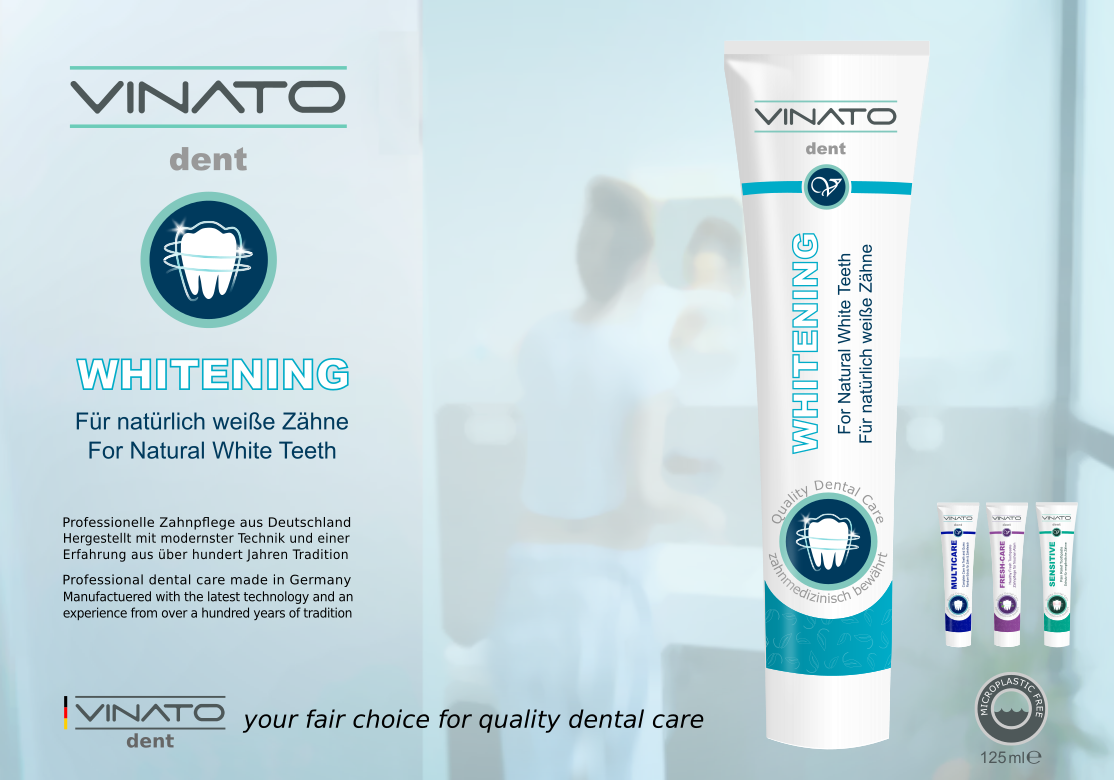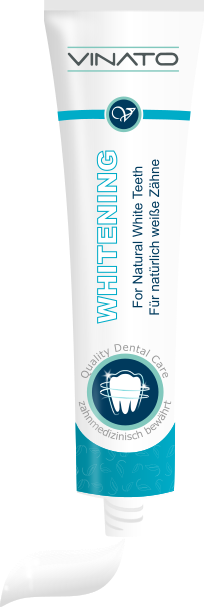
WHITENING


VINATO-dent WHITENING is a specially formulated toothpaste that contains an advanced formula for teeth whitening and promoting dental health. This toothpaste not only helps remove stains from teeth and give them a brighter appearance but also supports overall tooth health. Some of the deciding ingredients included in the formula are:
- pentasodium triphosphate dissolves discolorations on tooth surfaces and helps prevent dental plaque and tartar.
- carbamid helps neutralize tooth-damaging acids and brighten the appearance of teeth.
- sodium fluoride in an optimal dosage of 1450 ppm F‾ provides comprehensive caries prophylaxis.
- zinc chloride acts gently but effectively against dental plaque and tartar, thus ensuring overall improved dental care.
- natural peppermint oil, in combination with the selected flavor, ensures long-lasting fresh breath.
Using VINATO-dent WHITENING, you can achieve a radiant smile while supporting the health of your teeth.
We recommend using VINATO-dent WHITENING toothpaste twice a day for maximum results. Don’t forget to thoroughly rinse the toothpaste with water to remove any residue and ensure optimal oral hygiene.
Note: for people with increased tooth sensitivity, we recommend our VINATO-dent SENSITIVE toothpaste, which is specially designed for sensitive teeth.
Warning: for adults only!
Ingredients: Aqua, Sorbitol, Hydrated Silica, Pentasodium Triphosphate, Propylene Glycol, Urea, Xanthan Gum, Sodium C14-16 Olefin Sulfonate, Aroma, Sodium Fluoride, Zinc Chloride, Sodium Saccharin, Mentha Arvensis Leaf Oil, CI 77891.
|

Pentasodium triphosphate
Pentasodium triphosphate (also known as sodium tripolyphosphate) is a chemical compound used as a cleaning agent in toothpaste. It has the ability to bind calcium and magnesium ions in saliva and plaque that would otherwise contribute to increasing the hardness of dental plaque and tartar.
By binding these ions, the activity of enzymes and bacteria responsible for breaking down food particles and plaque is reduced. Pentasodium triphosphate also helps reduce tooth discoloration by decreasing the adsorption of pigments by the tooth surface.
Overall, the use of Pentasodium triphosphate in toothpaste helps keep teeth cleaner and brighter and reduces the occurrence of plaque and tartar.
The European Food Safety Authority (EFSA) has approved the use of Pentasodium triphosphate as a food additive in the EU and recommends a daily dose of 70 mg per kilogram of body weight.
The German Federal Institute for Risk Assessment (BfR) has also classified the use of Pentasodium triphosphate in food and cosmetics as safe, as long as the maximum allowed amount is not exceeded.
Zinc chloride
Zinc chloride possesses antimicrobial properties which can help reduce the amount of bacteria in the mouth, thereby also reducing bad breath. It can also aid in strengthening tooth enamel. When added to toothpaste, it can form a protective layer on the teeth, which can prevent erosion of the tooth enamel. Zinc is generally considered a safe ingredient in toothpaste, as long as it is used in the approved amount (according to the Federal Institute for Risk Assessment BfR in Germany, up to 1.0%).
Sodium Fluoride
Fluoride is a mineral that can help prevent tooth decay and cavities. It works by strengthening tooth enamel and making it more resistant to the acids produced by bacteria in the mouth. Fluoride can also help repair early stages of tooth decay before it becomes a cavity.
The use of fluoride in dental products has been widely accepted and endorsed by major dental organizations worldwide, including the World Health Organization, the American Dental Association, and the European Federation of Periodontology. The European Union and Germany have regulations in place regarding the use of fluoride in dental products.
In the EU, fluoride may be used in toothpaste, mouthwash, and other dental products at concentrations up to 1,500 parts per million (ppm) for adults and up to 500 ppm for children under the age of six. The use of fluoride in drinking water is also regulated by the EU, with a maximum concentration of 1.5 milligrams per liter (mg/L).
In Germany, the use of fluoride in dental products is also regulated. The maximum concentration of fluoride allowed in toothpaste for adults is 1,500 ppm, and for children under the age of six, it is 500 ppm. The concentration of fluoride in drinking water is also regulated, with a maximum concentration of 1.5 mg/L.
Overall, the use of fluoride in dental products has been shown to be safe and effective in preventing tooth decay and cavities. However, it is important to follow the recommended guidelines and regulations regarding fluoride use to ensure its safety and effectiveness.
To know more about Fluoride, please see our detailed article in Vinato-dent Magazine
Carbamide
Carbamide, also known as urea peroxide, is used as a whitener in toothpaste. It is a chemical compound that is released in the presence of hydrogen peroxide and enzymes, releasing oxygen. The released oxygen can then oxidize discolorations on teeth and thus brighten their appearance.
Carbamide is also often used in teeth whitening systems prescribed by dentists. In toothpaste, the concentration of carbamide is usually lower than in bleaching systems, making it less likely to cause side effects such as tooth sensitivity.
In the European Union, the use of carbamide in tooth whitening products and the maximum concentrations allowed in these products are regulated by the EU Cosmetic Regulation. The European Commission has evaluated the safety of carbamide in cosmetics and found it to be safe for human use under the established conditions.
The German Federal Institute for Risk Assessment (BfR) has also evaluated the use of carbamide in teeth whitening products and found it to be safe for human use when maximum concentrations are observed. However, the BfR recommends that individuals with tooth sensitivity or gum problems should consult a dentist before using teeth whitening products.
